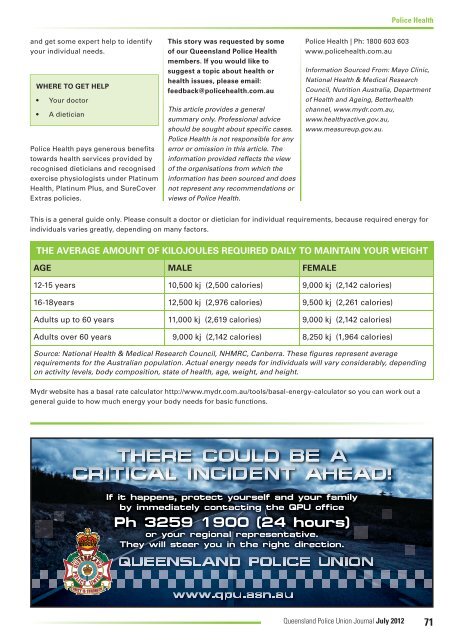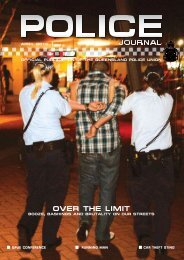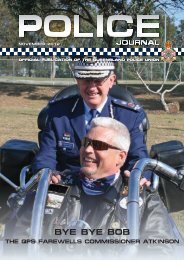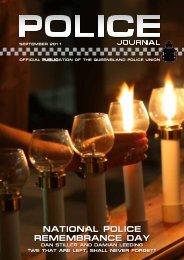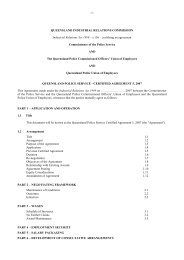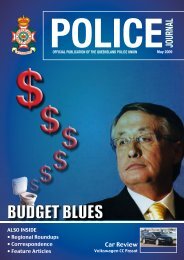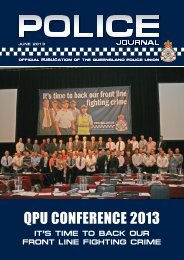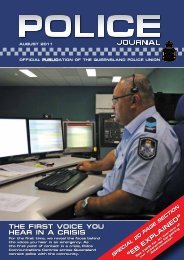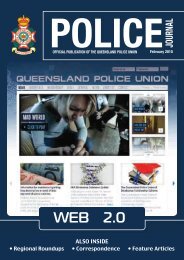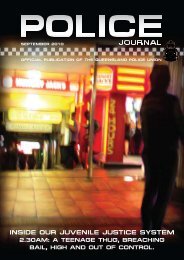Ph 3259 1900 (24 hours) - Queensland Police Union
Ph 3259 1900 (24 hours) - Queensland Police Union
Ph 3259 1900 (24 hours) - Queensland Police Union
Create successful ePaper yourself
Turn your PDF publications into a flip-book with our unique Google optimized e-Paper software.
<strong>Police</strong> Health<br />
and get some expert help to identify<br />
your individual needs.<br />
WHERE TO GET HELP<br />
• Your doctor<br />
• A dietician<br />
<strong>Police</strong> Health pays generous benefits<br />
towards health services provided by<br />
recognised dieticians and recognised<br />
exercise physiologists under Platinum<br />
Health, Platinum Plus, and SureCover<br />
Extras policies.<br />
This story was requested by some<br />
of our <strong>Queensland</strong> <strong>Police</strong> Health<br />
members. If you would like to<br />
suggest a topic about health or<br />
health issues, please email:<br />
feedback@policehealth.com.au<br />
This article provides a general<br />
summary only. Professional advice<br />
should be sought about specific cases.<br />
<strong>Police</strong> Health is not responsible for any<br />
error or omission in this article. The<br />
information provided reflects the view<br />
of the organisations from which the<br />
information has been sourced and does<br />
not represent any recommendations or<br />
views of <strong>Police</strong> Health.<br />
<strong>Police</strong> Health | <strong>Ph</strong>: 1800 603 603<br />
www.policehealth.com.au<br />
Information Sourced From: Mayo Clinic,<br />
National Health & Medical Research<br />
Council, Nutrition Australia, Department<br />
of Health and Ageing, Betterhealth<br />
channel, www.mydr.com.au,<br />
www.healthyactive.gov.au,<br />
www.measureup.gov.au.<br />
This is a general guide only. Please consult a doctor or dietician for individual requirements, because required energy for<br />
individuals varies greatly, depending on many factors.<br />
THE AVERAGE AMOUNT OF KILOJOULES REQUIRED DAILY TO MAINTAIN YOUR WEIGHT<br />
AGE MALE FEMALE<br />
12-15 years 10,500 kj (2,500 calories) 9,000 kj (2,142 calories)<br />
16-18years 12,500 kj (2,976 calories) 9,500 kj (2,261 calories)<br />
Adults up to 60 years 11,000 kj (2,619 calories) 9,000 kj (2,142 calories)<br />
Adults over 60 years 9,000 kj (2,142 calories) 8,250 kj (1,964 calories)<br />
Source: National Health & Medical Research Council, NHMRC, Canberra. These figures represent average<br />
requirements for the Australian population. Actual energy needs for individuals will vary considerably, depending<br />
on activity levels, body composition, state of health, age, weight, and height.<br />
Mydr website has a basal rate calculator http://www.mydr.com.au/tools/basal-energy-calculator so you can work out a<br />
general guide to how much energy your body needs for basic functions.<br />
If it happens, protect yourself and your family<br />
by immediately contacting the QPU office<br />
<strong>Ph</strong> <strong>3259</strong> <strong>1900</strong> (<strong>24</strong> <strong>hours</strong>)<br />
or your regional representative.<br />
They will steer you in the right direction.<br />
<strong>Queensland</strong> <strong>Police</strong> <strong>Union</strong> Journal July 2012 71


